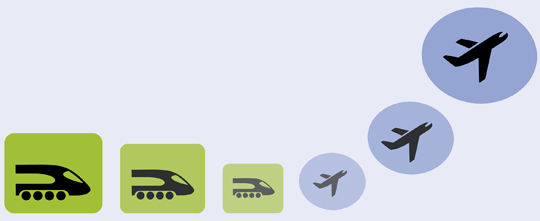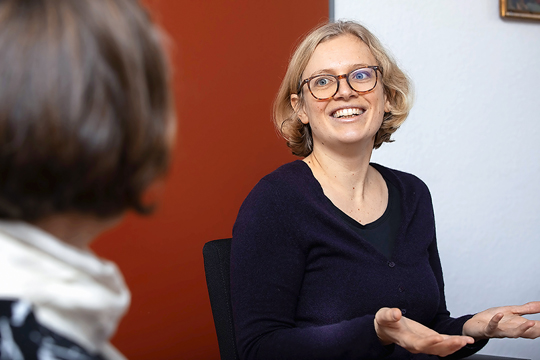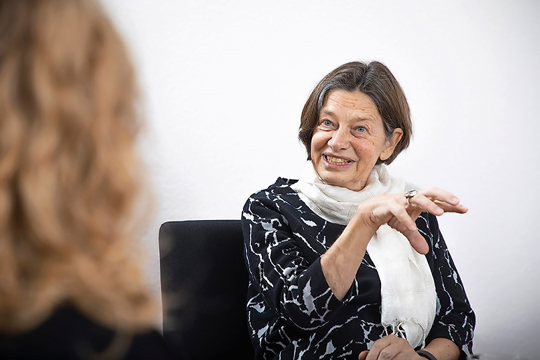Should I Stay on the Ground or Take Off?
Freiburg, Feb 24, 2020
Tourism can leave an enormous ecological footprint, which is why environmentally conscious people are rethinking how they travel. But what if it’s not possible to take a train instead of a plane? Whether they need to attend a conference, do field research, or take a sabbatical, researchers need to be mobile. Otherwise, they risk not being able to realize their projects and losing touch with the international community. Scientists4Future Freiburg, a group of researchers from the University of Freiburg, started a petition in 2019 asking the University administration to issue climate-conscious travel guidelines. Should the interests of researchers depend on geography? And are there other ways for academics to share their ideas with each other? Rimma Gerenstein discussed this issue with the two researchers Mareike Blum and Judith Schlehe. Mareike Blum, one of the authors of the petition, is currently writing her PhD thesis on transnational climate policy, and has done research for her PhD thesis in Uganda. Judith Schlehe is Professor of Anthropology and has been conducting research in Indonesia for more than 35 years.
 Photo: SimpLine/stock.adobe.com, montage: Jürgen Oschwald
Photo: SimpLine/stock.adobe.com, montage: Jürgen Oschwald
Ms. Blum, Ms. Schlehe, it’s too early to talk about 2020, so what business-related trips did you take in 2019?
Mareike Blum: 2019 was not a normal year for me because I didn’t travel much. I was busy writing my PhD thesis. In 2018, on the other hand, I traveled a lot to do field research. I studied a forest project in Uganda. Last year, I could have gone back to attend a summer school – two weeks, all expenses paid. But then I thought about it and decided it couldn’t really be justified. So I didn’t go.
Judith Schlehe: Last year was a relatively typical year for me. During the winter semester break, I flew to Indonesia for about four weeks to conduct field studies. Then something unusual happened in the summer: Friends from Indonesia came and visited me for the first time. Normally, only students, PhD candidates, or colleagues come to visit, but this time, it was friends that I’ve known for 35 years. They live in a village and couldn’t afford the flight until now.
Ms. Blum, the petition you started together with fellow researchers focuses primarily on flying.
Mareike Blum: Yes. We wanted to put business trips and environmental protection on the agenda. We see this as part of our social responsibility. We would like for the University to be more helpful with business trips, because it’s such a gray area. For example, if flying is cheaper than taking the train, do I have to fly?
So you want recommendations for what to do?
Mareike Blum: Exactly. Another possibility would be to work with a travel agency that specializes in international train travel. Or there are other options that could replace traveling altogether. Video conferences (VC) need to become more common practice. We need more conference rooms equipped with VC technology and trained service staff.
Judith Schlehe: I agree. If we don’t need to go far, or if the destination is within Europe, we can travel by train. However, I have to disagree about digital formats. Last year, I went to a major conference on Asia in Leiden in the Netherlands. Another researcher joined us by video conference. The connection was so bad that I couldn’t bear to listen to her presentation, and it was impossible to get a discussion going afterwards. Conferences are about meeting people in person and talking to them during coffee breaks. That’s vital for our work; that’s networking.
Mareike Blum: These kinds of encounters can result in incredible projects, and it’s especially important for a young researcher like me to network with colleagues, but you never know before a conference what’s actually going happen. Often, you’re disappointed. We mainly wanted for our petition to start a process of reflection.
 Mareike Blum is in favor of not going to a three-day conference if it means taking a long flight. Photo: Jürgen Gocke
Mareike Blum is in favor of not going to a three-day conference if it means taking a long flight. Photo: Jürgen Gocke
This process of reflection will lead to different results: Some people may decide they don’t need to go a conference, while others will still insist on flying to Berlin for two days.
Mareike Blum: Naturally, these decisions have to be made by each person individually. But I believe that there is a direct correlation between the personal level and the institutional framework. If the University were to issue recommendations, people would think things through more.
Judith Schlehe: Such recommendations shouldn’t come just from the University, but above all from the state and federal government. For example, we researchers can’t deduct carbon-offset donations for flights taken – neither with the University, nor with providers of external funding.
Ms. Schlehe, you wrote your PhD thesis in the 1980s. Forest death was the most important issue in the environmental debate back then. Did climate protection play a role in your research interests?
Judith Schlehe: Not at all, nor should it. This applies not only to my field, but to all disciplines. My favorite project is an exchange program in which German students go to Indonesia and students from Indonesia come to Germany, also to research us. Participating in this program, these encounters and these experiences – all of this is vital. But unfortunately, there’s still not a better solution than stupid airplanes.
Mareike Blum: The problem is also that our system doesn’t let us to take time to travel. We’re constantly under time pressure. A few years ago, there was a “slow food” trend. I wonder if we couldn’t also make a cultural change toward “slow travel.” I agree that you can’t replace field research, but I’m in favor of making your stay worthwhile.
What would that entail?
Mareike Blum: Not flying to a prestigious conference in the US for just three days, but trying to combine different things. For example, I did two months of field studies in Uganda and then I spent three weeks on vacation there.
And if you had the chance to choose your dissertation topic all over again today?
Mareike Blum: Maybe I wouldn’t do research in Uganda. Maybe I’d study a forest project in Romania instead. However, this doesn’t change the fact that studying international climate policy means you need both perspectives: the global and the local. Otherwise, you’re missing half the story. There are even more radical voices calling for a new kind of research: They want to make local research more prestigious than global research.
Judith Schlehe: That would be horrible. In a global world, we can’t say that research excludes everything that can’t be reached by bicycle. I think it’s a shame that so much energy goes into criticizing travel for field research purposes. What do we gain if a few less researchers fly to Asia or Latin America?
Mareike Blum: We can’t be perfect, we still have to travel. But we can’t ignore the problem any longer. We need to be aware of how privileged we researchers from wealthy industrial nations are. Our fellow researchers from the global South aren’t able to travel everywhere all the time. That is a general asymmetry.
Judith Schlehe: You could also see it the other way around. I’m thinking here about the conference in Leiden. More than half of the participants were from Asia. They finally have the resources to travel and be part of the conversation, but now we’re saying, “That’s really bad for the climate, please stay home.”
Mareike Blum: I think it’s good that there’s more interaction on equal grounds. Still, what’s happening is that a global elite of rich people is developing who use more resources than the rest. We could live like that if we had three planets.
 Judith Schlehe admires that other researchers are willing to put up with the stress of a long journey to participate in a conference. Photo: Jürgen Gocke
Judith Schlehe admires that other researchers are willing to put up with the stress of a long journey to participate in a conference. Photo: Jürgen Gocke
Judith Schlehe: I know fellow researchers who travel to Asia or the US for three days. We shouldn’t shame them for that. On the contrary, I admire that they’re willing to put up with all that stress. What we really need are new technologies for mobility.
Mareike Blum: Digital conferences would be one example.
Judith Schlehe: But not for field studies. It’s not what we see on a screen that we’re studying, but people’s everyday lives and all that entails. There’s no alternative for that.
Mareike Blum: What technologies do you mean then?
Judith Schlehe: Different airplanes. If we can send someone to the moon, we should be able to build more environmentally friendly airplanes.
Mareike Blum: I’m a bit skeptical about that. It means putting our trust in technology while maintaining the status quo instead of questioning our actions.
What do you think is essential for climate friendly research in the future?
Judith Schlehe: This problem runs through all levels of our existence. We can’t have a bad conscience just for living. We want the opposite: to celebrate life and do the things we need to do for our research. That’s what brings the global community forward.
Mareike Blum: Having a bad conscience can also motivate us. We want future generations to be able to celebrate life as well, but that won’t be possible if the planet is three degrees warmer. We always have to consider future generations.

